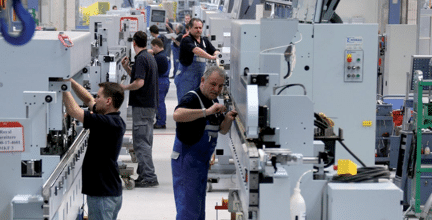GERMANY – VDMA, the German woodworking machinery association, informs that after 10 years of growth, the sales boom for the woodworking machinery industry will come to an end this year.

“The pandemic has put an additional damper on those industries that were already facing an economic downturn,” Pekka Paasivaara, chairman of the VDMA woodworking machinery association, said at the virtual general assembly.
In the first eight months of the year, the export value of German wood processing machinery fell by 15 percent year-over-year to 1.3 billion euros. Among the top-10 export destinations, only Austria, Brazil and Lithuania were able to increase their purchases. In the case of Brazil and Lithuania, the increase is the result of deliveries of individual large-scale plants. The two most important markets, China and the U.S., suffered above-average losses of 18 and 42 per cent respectively. The Chinese market is currently showing encouraging signs of recovery. This will have a positive impact on export figures in the coming months.
The pandemic is creating a lot of uncertainty about future economic development and that uncertainty is being compounded by the incalculable risks of Brexit, as well as increasing trade restrictions, which are having an impact on the export-oriented machinery industry.
For 2021, VDMA expects a slight recovery with an increase of three per cent, despite the restrictions that must be made at present to make a forecast meaningful. That means activity will remain well below that of previous years.
Despite these challenging times however, companies continue to invest in digitalization. And even though climate change is not currently top of mind, the topic will pick up speed again.
“It is a breakthrough for our customer industries and thus also for us machine suppliers that wood as a construction material is now receiving the recognition it deserves,” Paasivaara said.
“The positive contribution that wood as a renewable raw material can make to reducing the CO2-footprint, especially in the field of sustainable construction, is enormous. The woodworking machinery industry will do everything in its power to further develop this topic. That means we can look ahead with some optimism,” Paasivaara added.


0 Comments